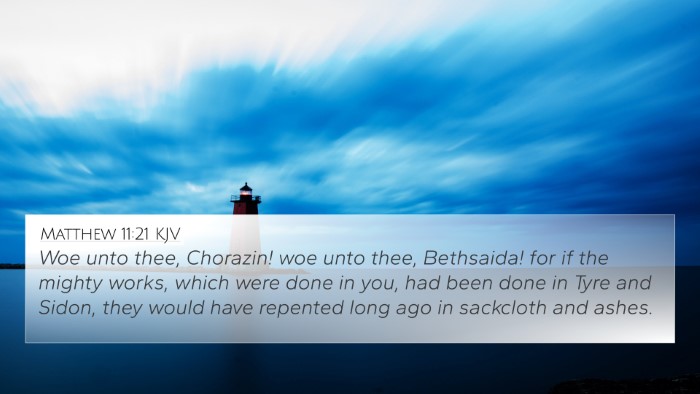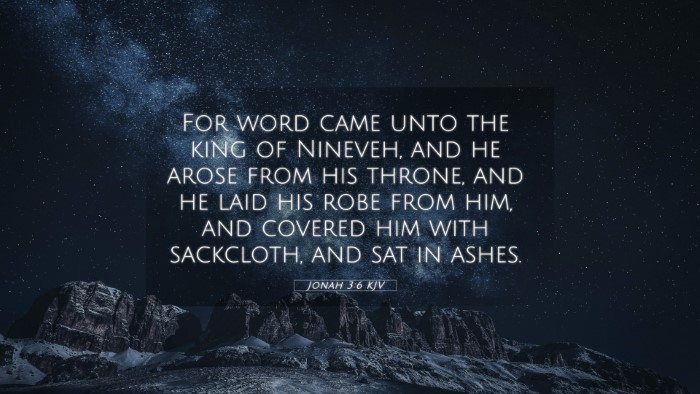Old Testament
Genesis Exodus Leviticus Numbers Deuteronomy Joshua Judges Ruth 1 Samuel 2 Samuel 1 Kings 2 Kings 1 Chronicles 2 Chronicles Ezra Nehemiah Esther Job Psalms Proverbs Ecclesiastes Song of Solomon Isaiah Jeremiah Lamentations Ezekiel Daniel Hosea Joel Amos Obadiah Jonah Micah Nahum Habakkuk Zephaniah Haggai Zechariah MalachiJonah 3:6 Similar Verses
Jonah 3:6 Cross References
For word came unto the king of Nineveh, and he arose from his throne, and he laid his robe from him, and covered him with sackcloth, and sat in ashes.
Uncover the Rich Themes and Topics of This Bible Verse
Listed below are the Bible themes associated with Jonah 3:6. We invite you to explore each theme to gain deeper insights into the Scriptures.
Jonah 3:6 Cross Reference Verses
This section features a detailed cross-reference designed to enrich your understanding of the Scriptures. Below, you will find carefully selected verses that echo the themes and teachings related to Jonah 3:6 KJV. Click on any image to explore detailed analyses of related Bible verses and uncover deeper theological insights.

Esther 4:1 (KJV) »
When Mordecai perceived all that was done, Mordecai rent his clothes, and put on sackcloth with ashes, and went out into the midst of the city, and cried with a loud and a bitter cry;

James 4:6 (KJV) »
But he giveth more grace. Wherefore he saith, God resisteth the proud, but giveth grace unto the humble.

Job 2:8 (KJV) »
And he took him a potsherd to scrape himself withal; and he sat down among the ashes.

Daniel 9:3 (KJV) »
And I set my face unto the Lord God, to seek by prayer and supplications, with fasting, and sackcloth, and ashes:

Luke 10:13 (KJV) »
Woe unto thee, Chorazin! woe unto thee, Bethsaida! for if the mighty works had been done in Tyre and Sidon, which have been done in you, they had a great while ago repented, sitting in sackcloth and ashes.

Matthew 11:21 (KJV) »
Woe unto thee, Chorazin! woe unto thee, Bethsaida! for if the mighty works, which were done in you, had been done in Tyre and Sidon, they would have repented long ago in sackcloth and ashes.

Ezekiel 27:30 (KJV) »
And shall cause their voice to be heard against thee, and shall cry bitterly, and shall cast up dust upon their heads, they shall wallow themselves in the ashes:

Jeremiah 13:18 (KJV) »
Say unto the king and to the queen, Humble yourselves, sit down: for your principalities shall come down, even the crown of your glory.

Jeremiah 6:26 (KJV) »
O daughter of my people, gird thee with sackcloth, and wallow thyself in ashes: make thee mourning, as for an only son, most bitter lamentation: for the spoiler shall suddenly come upon us.

Micah 1:10 (KJV) »
Declare ye it not at Gath, weep ye not at all: in the house of Aphrah roll thyself in the dust.
Jonah 3:6 Verse Analysis and Similar Verses
Understanding Jonah 3:6
Verse Text: "For word came unto the king of Nineveh, and he arose from his throne, and he laid his robe from him, and covered him with sackcloth, and sat in ashes."
Summary of Meaning
The verse Jonah 3:6 is pivotal in understanding the immediate response of the king of Nineveh to Jonah’s prophetic warning. The king's actions reflect a deep sense of repentance and humility before God.
Commentary Insights
- Matthew Henry's Commentary:
Henry emphasizes the immediacy of the king's response, demonstrating that true conviction leads to swift action. His laying aside of royal garments symbolizes forsaking pride and status in the face of divine judgment.
- Albert Barnes' Commentary:
Barnes notes the significance of the king taking off his robe and donning sackcloth. This act signifies genuine repentance, as sackcloth was traditionally worn in mourning and distress, indicating the king's recognition of his sinful state and the seriousness of the situation.
- Adam Clarke's Commentary:
Clarke highlights the king's ashes as a sign of utmost humility and desperation. By sitting in ashes, the king acknowledges his own mortality and the futility of human effort against divine will.
Bible Cross-References
This verse is connected to numerous other passages that reflect themes of repentance, humility, and divine mercy. Here are ten related verses that enhance our understanding of Jonah 3:6:
- 2 Chronicles 7:14: "If my people, which are called by my name, shall humble themselves, and pray, and seek my face, and turn from their wicked ways..."
- Matthew 11:21: "Woe unto thee, Chorazin! woe unto thee, Bethsaida! for if the mighty works, which were done in you, had been done in Tyre and Sidon, they would have repented long ago..."
- Luke 10:13: "Woe unto thee, Chorazin! woe unto thee, Bethsaida! for if the mighty works had been done in Tyre and Sidon..."
- James 4:10: "Humble yourselves in the sight of the Lord, and he shall lift you up."
- Psalms 51:17: "The sacrifices of God are a broken spirit: a broken and a contrite heart, O God, thou wilt not despise."
- 1 Peter 5:6: "Humble yourselves therefore under the mighty hand of God, that he may exalt you in due time."
- Revelation 2:5: "Remember therefore from whence thou art fallen, and repent, and do the first works..."
- Luke 13:3: "I tell you, Nay: but, except ye repent, ye shall all likewise perish."
- Isaiah 55:7: "Let the wicked forsake his way, and the unrighteous man his thoughts: and let him return unto the Lord..."
- Joel 2:12: "Therefore also now, saith the Lord, turn ye even to me with all your heart, and with fasting, and with weeping, and with mourning."
Thematic Connections
Jonah 3:6 can be understood within the broader biblical themes of repentance and God's mercy. The actions of the Ninevite king reflect a moment where divine judgment prompts a sincere turning from sin, which resonates throughout both the Old and New Testaments.
Conclusion
In summary, Jonah 3:6 serves as a powerful reminder of how leaders and followers alike must approach God with humility and sincerity. The king's responsive actions in response to Jonah’s warning establish a significant biblical precedent for repentance, showcasing God’s readiness to forgive those who earnestly seek Him.






